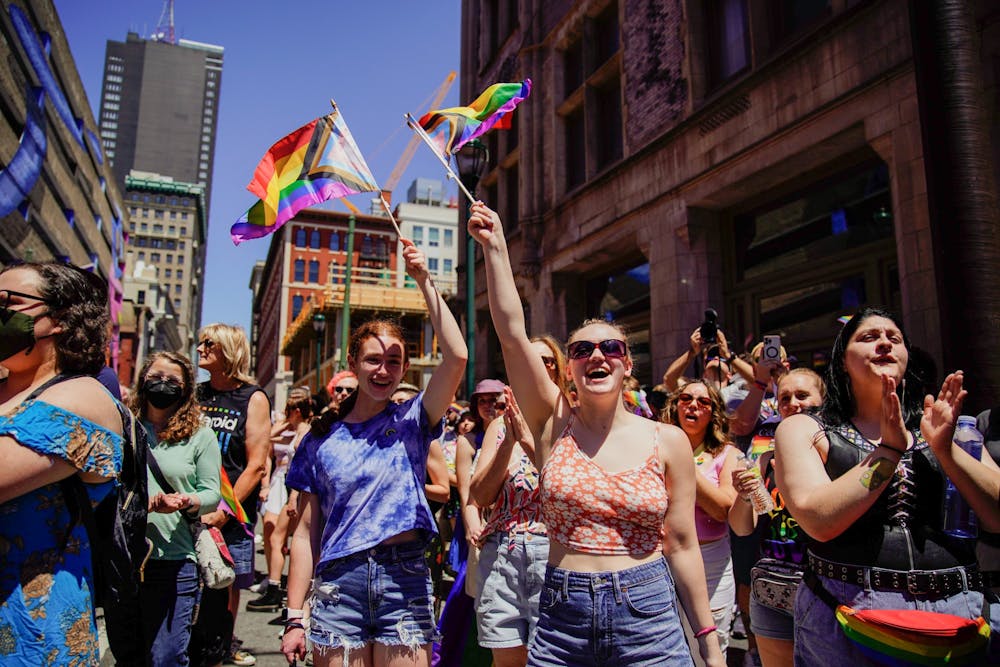Thousands of people celebrated the 50th anniversary of Philadelphia’s Pride March on June 5, after a two-year hiatus caused by the COVID-19 pandemic and controversy with previous organizers.
The Philadelphia Pride March, co-organized this year by the PHL Pride Collective and Philly Dyke March, was created to celebrate the LGBTQ community as part of June’s Pride month celebrations. According to The Philadelphia Inquirer, the march started in front of the National Constitution Center, proceeding through Center City and ending in the Gayborhood, a queer-friendly neighborhood. Attendees then dispersed into the Pride festival in the Gayborhood, which included dining, performances, and areas for relaxation. The event organizers sought to “[uplift] the most marginalized members of the LGBTQ+ community,” according to PHL Pride Collective’s website.
This year’s pride march comes amid a wave of anti-LGBTQ rhetoric from Pennsylvania politicians. Notably, the Republican candidate for Pennsylvania governor, Doug Mastriano, said that he would ensure that “'you can only use the bathroom that your biology anatomy says,'” The Washington Post reported. The Inquirer also reported that at least 456 books were banned in Pennsylvania school libraries in the second half of 2021 alone, with many of their stories centered around LGBTQ communities.
Rising College sophomore Sarah O’Konski joined the march at the Philadelphia Convention Center, where a number of speakers discussed political and social issues.
“[The speakers] were very adamant on [discussing] the importance of [transgender] women of color and their impact and where the first pride [march] came from. It was the first time I'd ever been in such a diverse and welcoming environment,” O’Konski told The Daily Pennsylvanian.
Philly Pride Presents, which organized past pride parades in Philadelphia, disbanded last year after being accused of racism and transphobia, NPR reported. This year’s organizers aimed to “honor Philadelphia’s activist’s past and present, celebrating what has been built together, and uplifting community joy”, the PHL Pride Collective wrote on its website.
Rising College sophomore Xandro Xu, who identifies as both Asian American and as part of the LGBTQ community, made a speech during the march. He hoped to spread a message of unity while also dispelling “minority myths'' about Asian Americans.
“[When] people think [of the] LGBTQ+ community, we think people are so inclusive because of all these identities that exist. But in fact, there is a lot of division that exists within the community,” Xu said to the DP. “Through this speech, [I tried to] dispel some of the stereotypes that are often associated with Asian Americans: that we are quiet, passive individuals that are not capable of standing up and speaking out.”
RELATED:
Penn student groups host QPenn, a weeklong event celebrating the LGBTQ community
S1E4: Pride Month Special Ft. Erin Cross and Isabella Schlatt
The intersectionality at the pride march was not just limited to ethnic and gender minorities. People with disabilities were also included. American Sign Language interpreters were present along the march route and acting as resources.
“The organizers did a really great job making sure inclusion was brought up, especially disability advocacy to the queer community. I have some issues with auditory processing, and I'm learning American Sign Language, so actually being able to see [interpreters at the march] was great,” O’Konski added.
O’Konski also noted that for older members of the LGBTQ community, 50 years of Pride in Philadelphia also means 50 years of progress.
“It’s a great thing that Philadelphia Pride has gone on for 50 years,” O’Konski said. “It shows the strength of the community [and that] we are resilient.”









